
|   |

|   |
Fine dance tributes to Kathak maestros - Vijay Shanker e-mail: vijaydance@gmail.com December 17, 2022 Dance tributes to Acharya Chaube Maharaj and Sitara Devi Kala Kriti Kendra and Bhavans Cultural Centre organized the 28th year of Acharya Maharaj Mahotsav and the centenary celebrations of Kathak queen Sitara Devi with a grand program of classical dance and music at S.P. Jain auditorium, Andheri west, Mumbai, on 6th November. The chief guest, the Governor of Maharashtra, Bhagat Singh Koshyari said, "Both Acharya Chaube Maharaj and Kathak queen Sitara Devi were great practitioners of the Kathak dance style and had devoted their lives to the propagation and promotion of this unique classical dance style of north India and I am glad the legacy moves forward with Jayanthimala, Rishika Mishra and Rajesh Mishra of Kala Kriti Kendra. India is known for its cultural values internationally and I am glad to note the contribution by devoted performers like Jayanthimala." 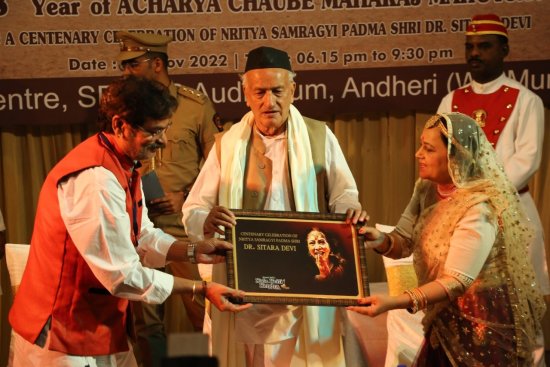 Rajesh Mishra, Governor, Jayanthimala The title of 'Kathak Queen' was bestowed on Sitara when she was a teenager, after Nobel laureate Gurudev Rabindranath Tagore was completely mesmerised by her scintillating performance. Sitara who was initially named Dhanno, belonged to the traditional family of dancers and musicians. She was the daughter of Acharya Sukhdev Maharaj who was a dance scholar, mentor and priest. When young Dhanno started learning Kathak at a tender age, it was a social taboo but her father encouraged his daughters Tara and Alaknanda to learn along with Dhanno the classical dance, which was normally known as Radha Krishna dance as stories from Hindu mythology was recreated in the dance format. The legacy moves forward with Jayanthimala, daughter and disciple of Sitara Devi and the granddaughter Rishika Mishra. 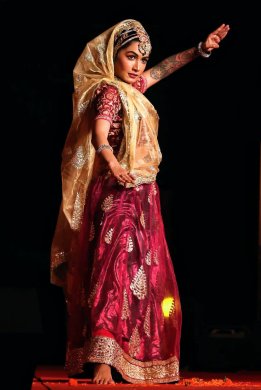 Rishika Mishra Kala Kriti Kendra was established by Jayanthimala and Rajesh Mishra with the intention to promote and propagate Indian classical dance and music by teaching young aspirants and performing for various occasions around the globe. The program commenced with the vivacious and brilliant Durga Stuti in praise of the virile and benevolent aspect of the goddess as the universal mother and the protector and savior of mankind. Performance by Rishika Mishra was noteworthy for its expressional quality and technical perfection, making a fine start to the program. 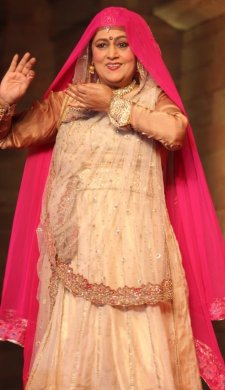 Jayanthimala In the brief Odissi recital by Ketaki Shetge, disciple of Guru Jhelum Paranjape, and dancers from Nritya Nikunj Institute, the dancers were pleasing in the expressional and pure dance sequences. Jayanthimala performed select items from the Kathak repertoire with intricate footwork and pure dance sequences. Her brief performance left a lasting impression on the select audience. Jayanti received fine orchestral support from Pt Kalinath Mishra on tabla, Somnath Mishra for vocal, Kunal Patil for pakhawaj and Aparna Deodhar for sitar. The highlight of the program was the Kathak performance by Hiroko Sarah Fukuda from Japan. Disciple of Guru Jayanthimala, Sarah has been learning and practising Kathak for more than a decade now. It was a pleasure to watch the Japanese dancer's interpretation of "Varade Veena" in fast tempo, revealing her mastery over the technique, dancing with a lot of excitement, devotion and rhythmic accuracy. 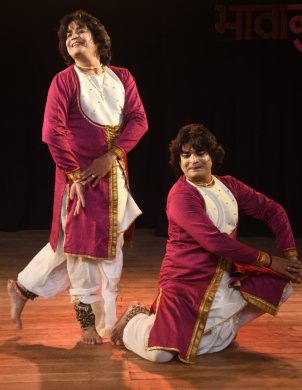 Gaurav and Saurav Mishra Another star attraction of the program was the young male dancers from Varanasi, Gaurav and Saurav Mishra. The look-alike brothers were a treat to watch as they performed with uniformity, precision and a lively quality that enhanced the artistic atmosphere of the festival. They belong to a traditional family of dancers and musicians and have several shows to their credit. 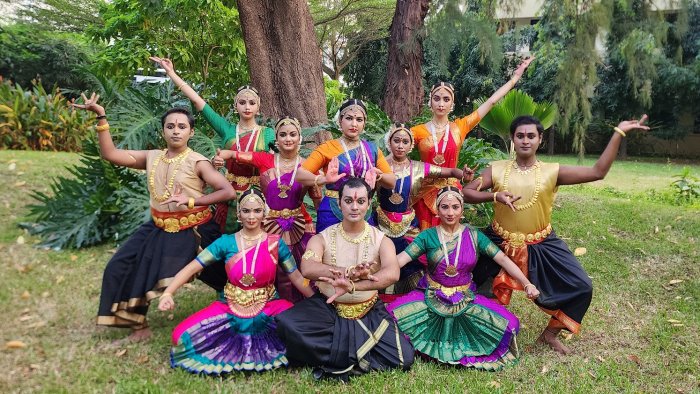 Nalanda troupe Dancers from Nalanda Nritya Kala Mahavidyalaya performed a few items from the Bharatanatyam repertoire, the Alarippu and an item on the goddess. The dancers were Vaidehi Rele-Lal, Tamohar Biswas, Chaitali Madkaikar, Abhijith Nair, Shefali Wadekar, Gargi Roy Choudhary, Teresa Chettiar, Gayatri Sathe, Shrijal Gupta and Mohanraj Acharya. It was a pleasure to watch the dancers dancing with clarity of movements, technical perfection and amazing expressions As the stage had limited space, it was not easy to manage the exposition of different movements but they managed it quite well, led by Vaidehi Rele. Dance tributes to Pt Rakhal Mishra and Pt Kishan Maharaj On behalf of Sangeet Samagam Trust, leading tabla maestro of Mumbai, Pandit Kalinath Mishra organised a two day musical program of classical dance and music, as a mark of tribute to his father Pt Rakhal Mishra (1899 -1998), veteran Hindustani music vocalist and Pt Kishan Maharaj, veteran tabla maestro of Banares, both of whom played a big part in shaping his career. Kalinath Mishra is a mentor with several disciples, has his own percussion musical ensemble and is credited with several performances both in India and abroad. Pt Kalinath has had the privilege of performing for some of the leading classical dancers and musicians of the country. The two day program was held on 25th November at Kanak Sabha of Nalanda Dance Research Centre, Juhu, and on 26th November at Bhavans Cultural Centre, Andheri. The first day program featured Kathak recital by Dr. Tina Tambe, Bharatanatyam recital by Dr. Uma Rele, and Kathak recital by the pride of Pune, Pt Nandkishore Kapote. Pandit Kalinath Mishra says, "This is an annual musical festival organized with the intention of expressing my reverence and gratitude to my father who taught me the basics of music and much more. Whatever success I have achieved I owe it to him and his blessings. I am glad the legacy moves forward as my elder son Satya Prakash Mishra is also a professional musician and is quite successful." 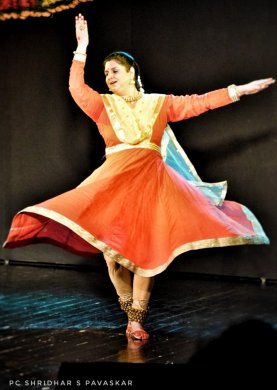 Tina Tambe The program made a fine start with the vivacious Kathak recital by Tina Tambe. It was a show with a live orchestra and the rhythmic accuracy was such that one felt it was a recorded performance. Tina commenced with the beautiful raag Malkauns in praise of the goddess, followed by teen taal with the exposition of varied pure dance numbers like tukde, paran, tatkaar etc. Tina demonstrated certain bandishes she had learnt from her mentor of Raigarh gharana, Guru Sucheta Harmalkar. She also executed some Shiv Paran and Chakkardar Paran with comfortable ease. Tina concluded with a Hori number with choreography by Pt Kartik Ram. Tina received fine orchestral support from Satya Prakash Mishra on tabla, Sriram Tambe on vocal and Alka Gujar on sitar. 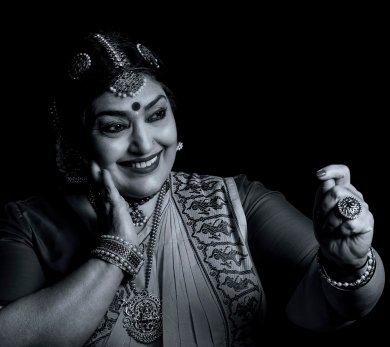 Uma Rele Dr. Uma Rele, principal of Nalanda Nritya Kala Mahavidyalaya, Mumbai, presented the popular "Krishna nee begane baro" (Purandaradasa composition) with a larger perspective pertaining to the relation of the bhakta with the paramatma, choreographed by Guru Deepak Mazumdar with a different approach. The number commences with the last paragraph (charanam) and then the pallavi comes, as the jeevatma is already enjoying the company of the paramatma, enjoying the bliss of bhakti and then comes to the duality, so it was from Advaita to Dvaita concept, interpreted with natural and divine expressions by Uma Rele. Incorporating mother Yasoda's vatsalya bhav, Yasoda realises that the little Krishna is no ordinary child, as she perceives him in three different avatars of matsya, kurma and varaha but still for mother Yasoda he is the ordinary little child and the love and devotion remains the same. Uma received fine orchestral support from Sandhya Pisharody on vocal, Ragavendra on flute, Balakrishna on violin and mridangam by Dakshinamoorthy. She has performed in some of the most prestigious festivals and is actively involved in dance education. 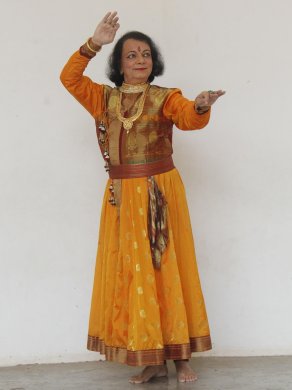 Nandkishore Kapote The last performer of the festival was the veteran exponent from Pune, Dr. Nandkishore Kapote, director of Performing Arts Faculty at Dr DY Patil Vidyapeet, celebrity Kathak mentor, choreographer, Phd guide and also the recipient of the SNA award. Nandkishore is among the foremost disciples of Pt Birju Maharaj and dances with high quality of professional expertise and dignity. The commendable musical rendering by Sanjay Garud enhanced the artistic atmosphere in the Bhimsen Joshi style of "Baje muraliya baje" incorporating the relation of Krishna with the entire universe and the living beings in nature and environment. Besides the brilliant exposition of pure dance sequences, the highlight was jugalbandi with tabla and the dancer as rhythmic syllables were demonstrated in the ascending order and finally reaching the pinnacle of rhythmic excellency with expert playing on the tabla by Pt Kalinath Mishra, Sanjay Garud on vocal, and Avinash on pakhawaj. On the whole it was a fine tribute to great maestros. 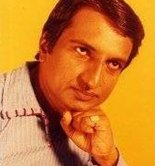 Vijay Shankar is a Kuchipudi and Kathakali exponent, teacher, bilingual journalist, arts critic and actor. |